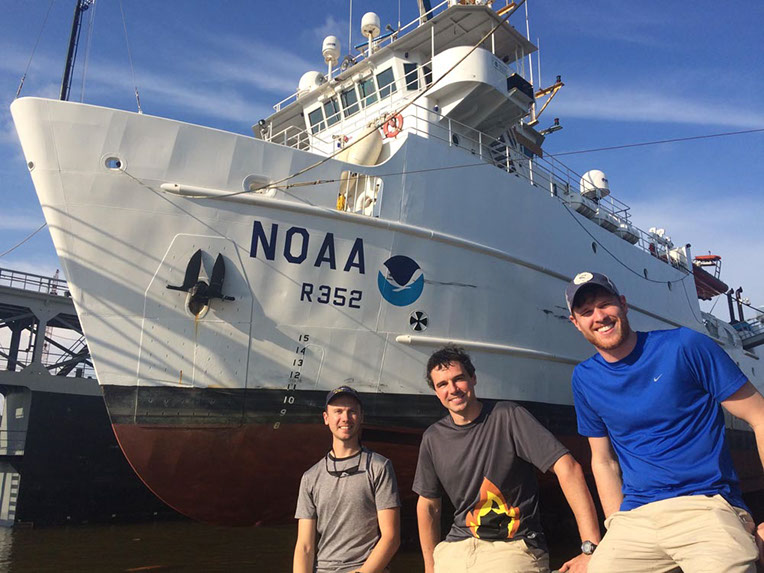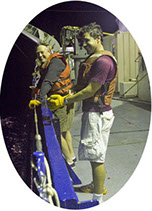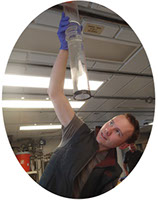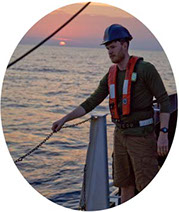We have an active and growing lab and are always looking for more undergrads who are interested in the ocean, marine biota, and global biogeochemistry. For current lab members, see the links on the left or scroll down below:

Dr. Mike Stukel
Mike is an associate professor at FSU. His research spans the intersection of plankton ecology and marine biogeochemistry. He has a love for all the zooplankton of the oceans and a passion for understanding how these microscopic organisms influence everything from the global climate to the local fisheries yield. Appendicularians are his favorite plankton. Unless it's ctenophores. Or salps. Perhaps phaeodarians, krill, Lingulodinium polyedrum, hyperiid amphipods, Tomopteris, or pyrosomes. It might be copepods. But he doesn't like chaetognaths. Contact: mstukel@fsu.edu

Tom Kelly
Tom is a graduate student in the FSU Plankton Ecology and Biogeochemistry Lab. His research focuses on marine biogeochemistry and the application of such diverse tools as radioactive isotopes and inverse models to understanding the biological pump. Tom has been one of the go-to members of our department for everything from computer programming to instrument engineering and biogeochemical modeling. He has also already logged several months at sea. Contact: tbk14@my.fsu.edu
Taylor Shropshire
Taylor is a graduate student at FSU working in the FSU Plankton Ecology and Biogeochemistry Lab and also at the Center for Ocean-Atmospheric Prediction Studies (COAPS). Taylor uses three-dimensional models of ocean circulation and plankton dynamics to understand the impact of a changing climate on key commercial fish species in the Gulf of Mexico. He's recently gotten a NOAA grant funded to fund his own research. Contact: tas14j@my.fsu.edu
Natalie Yingling
Natalie will be joining our lab in Fall 2018. She has received a Masters degree from Moss Landing Marine Laboratories and will be pursuing her Ph.D. at FSU.
Christian Fender
Christian comes to us from the University of South Florida where he conducted undergraduate research with jellies and earned his bachelor's degree in spring of 2018. He plans to conduct research with salps off the coast of New Zealand. Contact: ckf18b@my.fsu.edu
John Irving
John will be joining the lab in Fall 2018. He received a bachelor's degree from Stonehill College in Massachusetts, where he used ROMS model outputs and the LTRANS modeling package to quantify nutrient sources to the Gulf of Maine - research that he presented at the Ocean Sciences Meeting in Portland in Feb. 2018.
Matthew Smith
Matthew is an FSU undergraduate student who has been getting experience in our lab for the past semester. He will soon be undertaking his own research project in the laboratory.
Rebecca Morrow
Becca imaged fecal pellets using a dissecting microscope while working in our lab in spring of 2017. She continued her image analysis after graduating and her research was eventually submitted in a first authored manuscript at Deep-Sea Research I. Becca is currently pursuing her Masters degree with the International Master of Science in Marine Biological Resources (IMBRSea) Program.
Gabriela Vega
Gabby was an undergraduate who studied fecal pellet flux in our lab. She helped us develop some of our methods for quantifying fecal pellets in sediment trap samples.
Dr. Sven Kranz
Sven is the head of FSU's phytoplankton ecology lab. Since phytoplankton ecology and plankton ecology are very similar, we collaborate a lot. In fact, our collaborations pre-date our time at FSU; we first started working together in Antarctica in 2012. Sven focuses on photophysiology and carbon acquisition by marine phytoplankton. He complements his controlled laboratory experiments with in situ observations in the hopes of understanding how phytoplankton will adapt to increase CO2 levels. Contact: skranz@fsu.edu Website: https://ecophysiology.fit/
Tristyn Bercel
Tristyn is a grad student in Sven's phytoplankton ecology lab. Tristyn's research focuses on the physiological adaptations of phytoplankton to altered CO2 concentrations. She has been conducting most of her research in the lab, where she maintains phytoplankton cultures acclimated to pre-industrial, modern, and future CO2 levels and measures important physiological parameters such as growth rate and photosynthetic health. Contact: tbercel@fsu.edu
This portion of our website is specifically designed as outreach to the general public. If you are a scientist look for details about our research, please click on the red 'For Scientists' link on the top right.
Contact: Mike Stukel (mstukel@fsu.edu)
Florida State University
Dept. of Earth, Ocean, and Atmospheric Science
Center for Ocean-Atmospheric Prediction Studies
